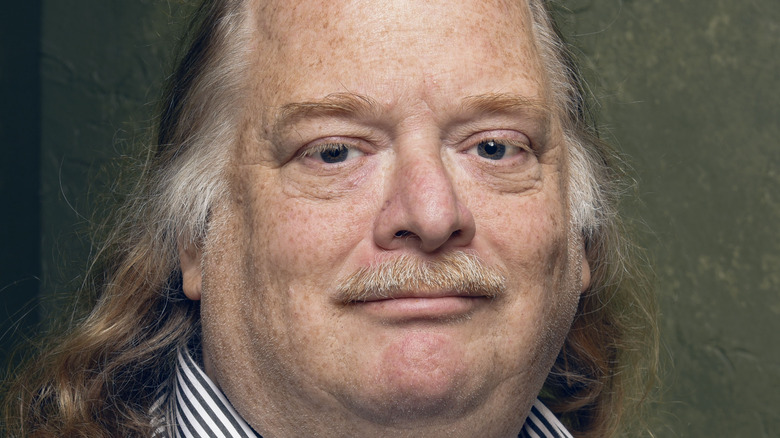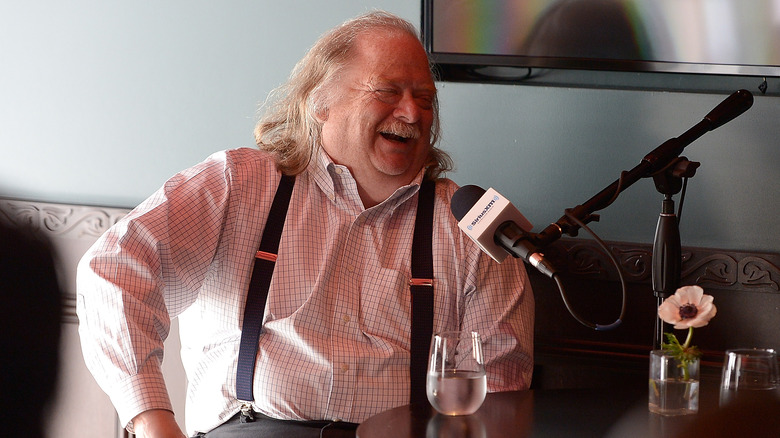Restaurant Critic Jonathan Gold's Devastating 2018 Death
It's impossible to recollect the life and influence of prolific food and restaurant critic Jonathan Gold without acknowledging his deep love for the city of Los Angeles. An L.A. native born in the 1960s, Gold was from the start a student of music and culture; He grew up a classically-trained musician playing the cello in punk rock bands and wrote for L.A. Weekly on topics ranging from art, music, movies, and food — and became one of the most celebrated restaurant critics of the culinary world (via Los Angeles Times). He was the first restaurant critic to receive a Pulitzer Prize for his efforts, earned in 2007, and Pulitzer acknowledges him for winning James Beard Awards for newspaper and magazine reviews.
But the real Jonathan Gold amounted to much more than the sum of his accolades or the names of famous publications he wrote for, which included, per Pulitzer, Rolling Stone, Spin, Vanity Fair. In a 2015 interview with Vice, he declared his role as a critic was to "democratize food" and "get people to live in the entire city of Los Angeles." While many of his food critic peers were living by the standards of the Michelin star, his appreciation for good food transcended these paradigms and sought to elevate authentic L.A. flavors from traditional ethnic cuisines, food trucks, and mom-and-pop restaurants (via Leite's Culinaria). Gold wrote from a perspective of looking for the deliciousness of a meal, notably saying of restaurant owners in the documentary, "City of Gold," "You want these guys to succeed."
Jonathan Gold's untimely death and its impact on L.A.'s culinary community
After nearly 40 years of writing about the food that makes his city the unique and diverse cultural melting pot we know it as today, the "belly of Los Angeles" passed from this world (via Discover Los Angeles) on July 21, 2018 from pancreatic cancer (via Los Angeles Times). Gold died at age 57, leaving a bereaved culinary community adjusting to the loss of one of the most pioneering trailblazers.
His friend and former food critic Ruth Reichl told Eater she was "devastated" by the loss and went on to point out that Gold understood "was a gateway into the people ... He was really writing about the people more than the food." This sentiment was echoed by many influential culinary figures throughout L.A, including renowned chef, restaurant owner, and longtime friend Nancy Silverton, who called him "the ambassador for our city" (from Los Angeles Times). Peter Meehan, an editor of the former food magazine Lucky Peach, called Gold the "conduit for the stories of Los Angeles," while filmmaker Laura Gabbert noted, "I can't imagine the city without him ... We won't have the soul."
Given the rapid progression of his illness and untimely death that left many fans and peers in shock, the owner of The Times, Dr. Patrick Soon-Shiong, called his death "heartbreaking" and "an incalculable loss" (via Los Angeles Times).
Celebrating the world of the 'belly of Los Angeles'
Jonathan Gold revolutionized the way gourmands thought of the role of a food critic, reaching into the heart of his community and bringing hole-in-the-wall restaurants that might otherwise have been overlooked into the limelight. He endeavored to reflect the authentic L.A. experience, bringing a diverse array of restaurants to the forefront of culinary conversation, including Meals by Genet, Oaxaca Institution of Guelaguetza, Jitlada (home to dishes Gold notoriously dubbed "ferociously spicy"), and Mariscos Jalisco taco truck, per The Dallas Morning News. Through most of his work, he remained anonymous in keeping with food critic traditions but abandoned this self-described "peekabo" practice in 2015, describing it as unhelpful to restaurants and critics alike (via Los Angeles Times).
In 2000, Gold published a book called "Counter Intelligence: Where to Eat in the Real Los Angeles," offering locals and visitors of L.A. tips on where to eat the best food in the city — whether in pursuit of Iranian food, Italian, Japanese, Mexican, Peruvian, Thai... the list goes on. While Gold may have been notoriously bad at completing projects before predetermined deadlines (from Los Angeles Times), perhaps his greatest contribution to the culinary conversation was his humanist perspective on what "good" food really means.
As Meehan described, speaking to the Los Angeles Times, "Jonathan didn't write restaurant reviews, he wrote about who we are and how we feed each other. He wasn't just a better writer than the rest of us, he cared more, too."


